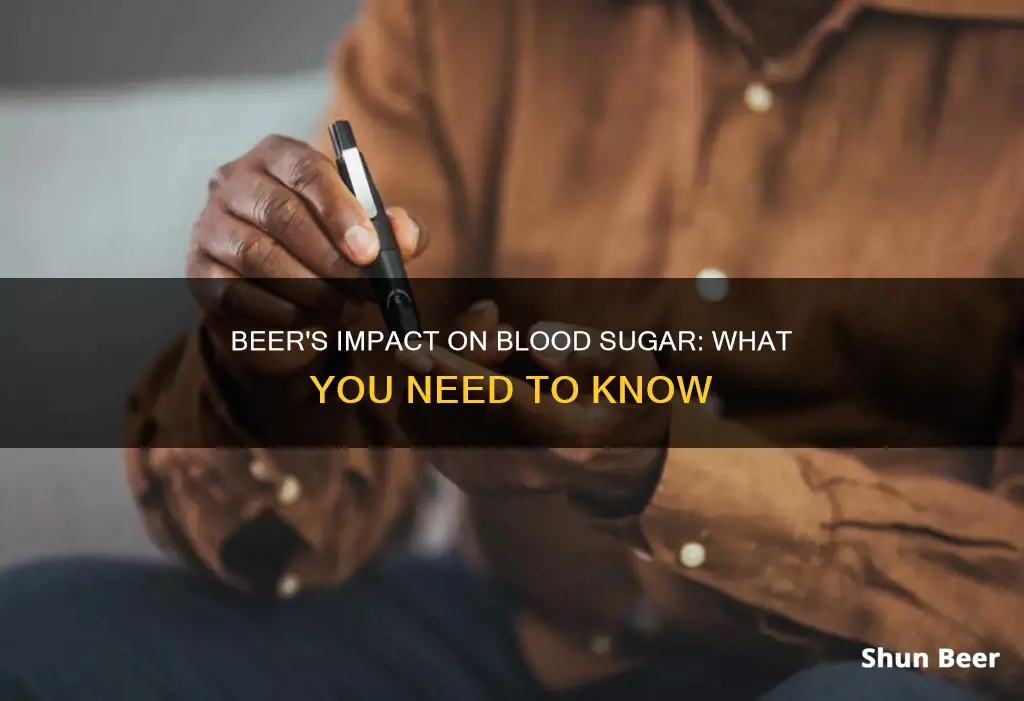
Drinking beer can have a significant impact on your blood sugar levels, and this effect can be felt for up to 12 hours after your last drink. Beer contains carbohydrates, which are quickly absorbed into the bloodstream, leading to increased glucose levels. Alcohol also stimulates the appetite, so you may end up eating more than usual, which can further increase blood sugar. Additionally, alcohol interferes with the body's ability to regulate blood sugar, as the liver prioritises breaking down alcohol over releasing glucose. This can lead to hypoglycaemia, which is particularly dangerous for those with diabetes.
| Characteristics | Values |
|---|---|
| Effect on blood sugar levels | Beer can increase blood glucose levels as it contains carbohydrates that get absorbed into the bloodstream relatively quickly. However, drinking a lot of beer can also reduce blood glucose levels, leading to hypoglycemia. |
| Effect on appetite | Alcohol stimulates the appetite, which may lead to overeating and weight gain. |
| Effect on medication | Alcohol can interfere with diabetes medications, making them less effective. |
| Effect on blood sugar regulation | Alcohol interferes with blood sugar regulation by disrupting the hormones that control it. |
| Effect on other organs | Beer and other alcoholic drinks can affect the liver, heart, kidneys, and pancreas. |
What You'll Learn

Beer can increase blood sugar levels
Beer can have a significant impact on blood sugar levels, and this effect can last up to 12 hours after consuming alcohol. Here are some key points to understand how beer influences blood glucose levels and why it is essential to monitor your health:
Carbohydrates in Beer
Beer contains carbohydrates, which are quickly absorbed into the bloodstream, leading to increased glucose levels. The number of carbohydrates in beer varies depending on the type, with "light" beers typically containing fewer than five grams per serving and craft beers such as IPAs and stouts containing 15 grams or more.
Immediate and Long-Lasting Effects
Elevated blood sugar levels can be observed shortly after consuming beer. However, the effects of alcohol on blood sugar can be seen for up to 12 hours after your last drink. Therefore, it is crucial to monitor your blood glucose levels not only before and during drinking but also for several hours afterward.
Alcohol's Interference with Blood Sugar Regulation
Alcohol interferes with the body's ability to regulate blood sugar. According to Dr. Kelvin Fernandez, an internal medicine physician, "alcohol diverts metabolic pathways, disrupting glucose production in the liver and contributing to low blood sugar." Additionally, alcohol can decrease insulin sensitivity, further impacting the body's ability to manage blood sugar effectively.
Increased Risk of Hypoglycemia
Consuming alcohol increases the risk of hypoglycemia, or low blood glucose levels, especially for individuals with type 1 diabetes and those with type 2 diabetes using insulin. The symptoms of hypoglycemia can range from mild, such as fatigue, sweating, and an irregular heartbeat, to more severe, including confusion, abnormal behavior, blurred vision, seizures, and loss of consciousness.
Impact on Appetite and Weight Gain
Alcohol stimulates the appetite, and when consumed with a meal, it can lead to overeating. This, in turn, can increase blood glucose levels and contribute to weight gain. Alcoholic drinks are often high in calories, making it more challenging to manage weight and control blood sugar.
Precautions and Recommendations
If you have diabetes or are concerned about blood sugar management, it is essential to consult with your doctor about drinking beer. They can provide personalized advice and guidelines based on your specific health needs. In general, drinking in moderation, ensuring you don't drink on an empty stomach, and pairing alcohol with food or a carbohydrate-rich snack are recommended.
Post-Hysterectomy: Beer Drinking and Recovery
You may want to see also

Drinking a lot of beer can reduce blood sugar levels
While drinking in moderation can have some health benefits, excessive alcohol consumption can lead to reduced blood sugar levels, a condition known as hypoglycemia. This is especially true for those with type 1 diabetes or type 2 diabetes using insulin. The effects of low blood sugar can range from mild symptoms such as fatigue, sweating, and an irregular heartbeat, to more severe consequences like confusion, abnormal behaviour, blurred vision, and even seizures or loss of consciousness.
When you drink alcohol, your liver's ability to release glucose into the bloodstream is hindered as it prioritises breaking down the toxins from the alcohol. This disruption in glucose production can lead to a drop in blood sugar levels, which can be further exacerbated if drinking on an empty stomach. Additionally, alcohol can interfere with the hormones that regulate blood sugar levels, leading to decreased insulin sensitivity and further impairing the body's ability to manage blood sugar effectively.
Beer and other alcoholic drinks also tend to be high in carbohydrates, which can cause a temporary spike in blood sugar levels. However, when consumed in excess, the calories from these carbohydrates can be stored in the liver as fat, leading to increased insulin resistance and higher blood sugar levels over time. Therefore, it is crucial to monitor blood sugar levels before, during, and up to 24 hours after drinking alcohol, especially for those with diabetes or blood sugar concerns.
To minimise the risk of reduced blood sugar levels, it is recommended to drink in moderation, ensuring that alcohol is consumed with food, especially carbohydrate-rich snacks. Avoiding drinking on an empty stomach can help prevent a sudden drop in blood sugar. It is also important to stay hydrated with water or diet soda and to pace yourself by limiting the number of drinks consumed per hour.
While drinking a lot of beer can reduce blood sugar levels, it is important to note that excessive alcohol consumption can have other detrimental effects on the body, including weight gain, increased blood pressure, and liver disease. Therefore, it is always advisable to consult with a doctor or healthcare professional to understand the risks and make informed decisions about alcohol consumption, especially for individuals with diabetes or other health conditions.
Rusty's Vacation Beer Choice: What Did He Drink?
You may want to see also

Alcohol interferes with blood sugar regulation
Secondly, alcohol can affect the breakdown and release of glucose. The liver, which is responsible for storing and releasing glucose into the bloodstream, prioritises breaking down alcohol instead of releasing glucose when an individual consumes alcohol. This interruption can cause a rapid drop in blood sugar levels, leading to hypoglycemia. The risk of hypoglycemia is heightened when drinking on an empty stomach, as the liver has no food-derived glucose to release.
Additionally, alcohol can affect insulin production and effectiveness. Excessive alcohol consumption over time can reduce the overall effectiveness of insulin, resulting in high blood sugar levels. Alcohol can also interfere with the positive effects of oral diabetes medications or insulin, as it prevents the liver from converting proteins and fats into carbohydrates, which is necessary for the body during periods of energy demand.
Furthermore, alcohol stimulates the appetite, often leading to overeating and disrupting blood sugar control. Alcoholic drinks are often high in calories, making weight loss or management more challenging. This can create a cycle where blood sugar levels are impacted both by the alcohol itself and by the increased food consumption it encourages.
Beer's Impact: Understanding Alcohol's Effect on Your Body
You may want to see also

Alcohol can affect diabetes medications
Additionally, alcohol can reduce the effectiveness of diabetes medications, including oral hypoglycaemic drugs and insulin. It can interfere with the positive effects of these medications, making them less effective in controlling blood sugar levels. Alcohol consumption can also cloud a person's judgement, making it difficult for them to accurately monitor their blood sugar levels and adjust their medication or dietary intake accordingly.
Furthermore, alcohol can increase the risk of low blood sugar (hypoglycaemia) for up to 24 hours after drinking. This prolonged effect means that blood sugar levels need to be closely monitored even after the drinking episode has ended. The risk of hypoglycaemia is also influenced by the amount of alcohol consumed, with a higher number of drinks increasing the risk. Therefore, it is crucial for individuals with diabetes to be aware of the interaction between alcohol and their medications and to consume alcohol in moderation, if at all.
It is always advisable for individuals with diabetes to consult their doctor or healthcare provider before consuming alcohol. The doctor can provide personalised advice and guidelines based on the individual's specific health status, medication regimen, and other relevant factors.
John Daly's Beer Choice: What's in the Fridge?
You may want to see also

Beer is high in carbohydrates
Beer is typically higher in carbohydrates than other alcoholic drinks like wine or liquor. The carb content of beers can vary widely depending on the type of beer. "Light" beers have the fewest carbs, usually five grams or less per serving, and are also lower in alcohol content. Hoppy craft beers like IPAs and stouts tend to be much higher in carbs, usually with 15 grams or more per serving. They also tend to be higher in calories and alcohol content, so it's best to stick to just one serving.
Beer cans and bottles do not typically display nutritional information, so it can be challenging to know the number of calories and carbs in a serving. However, you can find nutrition information for some major beer brands on websites like www.calorieking.com.
Beer and other alcoholic beverages can affect your blood sugar levels. Alcohol interferes with the hormones that regulate blood sugar levels. According to internal medicine physician Dr. Kelvin Fernandez, "alcohol diverts metabolic pathways, disrupting glucose production in the liver, and contributing to low blood sugar. It can also decrease insulin sensitivity, impacting the body's ability to regulate blood sugar effectively."
Beer contains carbohydrates that are absorbed into the bloodstream relatively quickly, leading to increased glucose levels. Usually, elevated blood sugar is observed shortly after consuming alcohol. However, drinking a lot of beer can also reduce blood glucose levels, increasing the risk of hypoglycaemia, especially for those with type 1 or type 2 diabetes using insulin.
The Science Behind Foam Beer Koozies: Do They Work?
You may want to see also
Frequently asked questions
Drinking beer can cause your blood sugar to drop very low, a condition known as hypoglycemia. Beer is also high in carbohydrates, which can raise blood sugar levels. Therefore, it is not good for your blood sugar.
Alcohol consumption recommendations are generally the same for people with diabetes as for the rest of the population: no more than one drink a day for women and up to two drinks a day for men. However, it is best to consult a doctor for a personalised recommendation.
Drinking beer can cause low or high blood sugar, affect diabetes medications, and cause other possible problems. Beer is high in carbohydrates, which can raise blood sugar levels. Alcohol also has a lot of calories, which can lead to weight gain and make it harder to manage diabetes.
Symptoms of low blood sugar include headaches, irregular heartbeat, anxiety, confusion, seizures, flushing, nausea, increased heart rate, and slurred speech.







